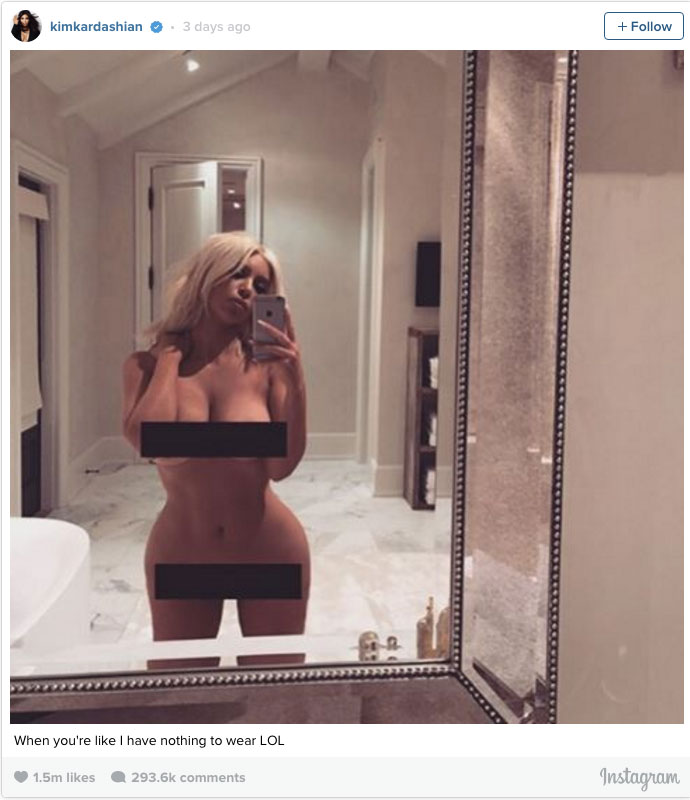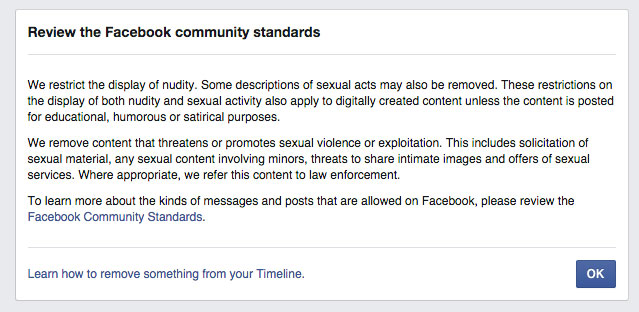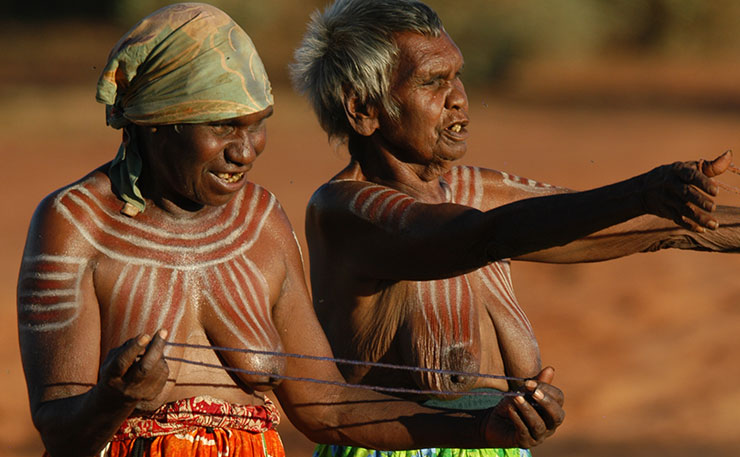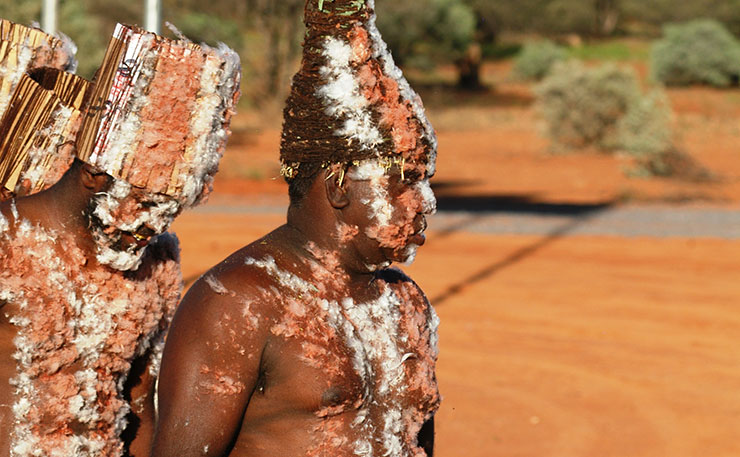A speech published in New Matilda which argues that Aboriginal women are shamed for their nudity, while the nudity of non-Aboriginal women is celebrated, has been banned by Facebook because it included an image of two topless women from Central Australia ‘painted up’ and performing an ancient Aboriginal ceremony.
In addition, the accounts of multiple readers who shared the story and image on community pages were also briefly suspended, and the prominent Aboriginal woman who delivered the speech, Celeste Liddle, has copped a 24-hour ban from the social media platform.
Meanwhile, over in Hollywood, Kim Kardashian has also ‘painted up’, for a story published by Esquire magazine and promoted on their Facebook page. It remains there this morning, apparently without objection from the social media giant.
In the New Matilda image (which originally ran unpixelated, see below), the women are wearing dresses and ceremonial body paint, with their breasts exposed. The Kardashian image, by contrast, depicts the reality television star completely naked, with white paint covering her nipples.
 Esquire’s Kardashian story is in response to the social media frenzy over the reality television star’s posting of a random nude photograph from her Instagram account on Sunday night.
Esquire’s Kardashian story is in response to the social media frenzy over the reality television star’s posting of a random nude photograph from her Instagram account on Sunday night.
It was published on March 9, International Women’s Day.
In it, Kardashian writes: “It’s 2016. The body-shaming and slut-shaming – it’s like, enough is enough. I will not live my life dictated by the issues you have with my sexuality. You be you and let me be me.”
New Matilda’s article was also published on International Women’s Day. It’s the written version of a 6,000-word speech delivered to the Queen Victoria Women’s Centre in Melbourne by prominent Aboriginal writer, unionist and feminist Celeste Liddle (you can read her popular blog ‘The Rantings of an Aboriginal Feminist’ here’).
In her speech, Liddle delivered an Indigenous perspective on feminism, and noted that Aboriginal woman are shamed for their nudity, while the nudity of non-Aboriginal women is celebrated.
“I say this, by the way, not to demonise young, pretty, blonde women but to point out that the offence actually comes from the male gaze, and what that gaze deems acceptable,” wrote Liddle.
“Aboriginal women are not acceptable. Older women aren’t acceptable, particularly if their breasts are pendulous rather than perky. Women being semi-naked for the purpose of taking part in women’s culture are not acceptable.
“If they are going to be semi-naked, it needs to be for the enjoyment of men.”
Last night, Facebook banned the article from New Matilda’s page on the grounds it breached acceptable community standards.

“We restrict the display of nudity,” warned Facebook. “Some descriptions of sexual acts may also be removed. These restrictions on the display of both nudity and sexual activity also apply to digitally created content unless the content is posted for educational, humourous or satirical purposes.”
Liddle told New Matilda this morning that she received a 24-hour ban from Facebook.
“My ban is because I’ve previously published images of nudity,” Liddle said. “I’m apparently a ‘repeat nudity poster offender’.”
Her speech references the earlier Facebook ban, after she shared a video showing topless Aboriginal women performing traditional dance.
“I feel decidedly smug this morning, because everything I spoke about in my speech on this particular topic just seems to have been proven completely true,” she said.
“It’s actually a highly amusing outcome.”

The ‘offending’ New Matilda image was one of a series taken in 2010 (by this writer) during a trip to the Utopia region in Central Australia, 350 km north east of Alice Springs.
Aboriginal people in the remote community of Ampilatwatja (pronounced UM-BUDDER-WATCH) had walked off their community and established a nearby camp in protest at the federal government’s ‘Northern Territory intervention’, a policy launched in the shadow of a federal election, and slammed as “racist” by the United Nations.

In 2007, the Howard government used the Australian Army to seize control of remote communities, on the pretext that paedophilia rings were running rampant throughout the Northern Territory (claims aired by ABC’s Lateline program which later proved to be false).
With the help of the Maritime Union of Australia, the people of Ampilatwatja built a home on land outside the control of the federal government, and used it as a base for their protests.
The ceremony attracted hundreds of supporters from the around the nation, with Alyawarre (pronounced ILL-YOW-RA) men and women performing dances and ceremonies to thank guests for their support.
New Matilda is seeking comment from Facebook.
UPDATE: On Monday morning, a Facebook spokesperson provided the following response.
“We are aware that people people sometimes share content containing nudity for reasons like awareness campaigns, artistic projects or cultural investigations. The reason we restrict the display of nudity is because some audiences within our global community may be sensitive to this type of content – particularly because of cultural background or age. In order to treat people fairly and respond to reports quickly, it is essential that we have policies in place that our global teams can apply uniformly and easily when reviewing content. As a result, our policies can sometimes be more blunt than we would like, and restrict content shared for legitimate purposes. We encourage people to share Celeste Liddle’s speech on Facebook by simply removing the image before posting it.”
New Matilda is one of Australia’s most popular independent media outlets. We rely almost entirely on reader subscriptions for our survival. You can subscribe here from as little as $6 per month. When we’re not getting suspended, New Matilda Facebooks here and we tweet here.
Donate To New Matilda
New Matilda is a small, independent media outlet. We survive through reader contributions, and never losing a lawsuit. If you got something from this article, giving something back helps us to continue speaking truth to power. Every little bit counts.




